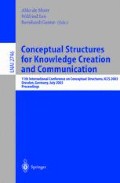Abstract.
The purpose of this paper is to clarify in the framework of Temporal Concept Analysis the distinction between the notion of the dimension of time and the one-dimensionality of life tracks of simple objects. The reader is led to the central problems by many examples.
Access this chapter
Tax calculation will be finalised at checkout
Purchases are for personal use only
Preview
Unable to display preview. Download preview PDF.
References
Arbib, M.A.: Theory of Abstract Automata. Prentice Hall, Englewood Cliffs (1970)
Aristoteles: Philosophische Schriften in sechs Bänden. Felix Meiner Verlag, Hamburg (1995)
Eilenberg, S.: Automata, Languages, and Machines, vol. A. Academic Press, London (1974)
Einstein, A.: Zur Elektrodynamik bewegter Körper. Annalen der Physik 17, 891–921 (1905)
Einstein, A.: Über das Relativitätsprinzip und die aus demselben gezogenen Folgerungen. In: Jahrbuch der Radioaktivität und Elektronik, vol. 4, pp. 411–462 (1907)
Einstein, A.: The collected papers of Albert Einstein: The Swiss Years: Writings, 1900-1909, vol. 2. Princeton University Press, Princeton (1989)
Gabbay, D.M., Hodkinson, I., Reynolds, M.: Temporal Logic - Mathematical Foundations and Computational Aspects, vol. 1. Clarendon Press, Oxford (1994)
Ganter, B., Wille, R.: Conceptual Scaling. In: Roberts, F. (ed.) Applications of combinatorics and graph theory to the biological and social sciences, pp. 139–167. Springer, New York (1989)
Ganter, B., Wille, R.: Formal Concept Analysis: mathematical foundations (translated from the German by Cornelia Franzke). Springer, Heidelberg (1999)
Gottwald, S. (ed.): Lexikon bedeutender Mathematiker. Bibliographisches Institut (1990)
Hawking, S.: A Brief History of Time: From the Big Bang to Black Holes. Bantam Books, New York (1988)
Hawking, S., Penrose, R.: The Nature of Space and Time. Princeton University Press, Princeton (1996)
Isham, C.J.: Time and Modern Physics. In: Ridderbos, K. (ed.) Time, pp. 6–26. Cambridge University Press, Cambridge (2002)
Kalman, R.E., Falb, P.L., Arbib, M.A.: Topics in Mathematical System Theory. McGraw-Hill Book Company, New York (1969)
Kant, I.: Kritik der reinen Vernunft. In: Weischedel, W. (ed.) Immanuel Kant - Werke in sechs Bänden. Band II, Insel Verlag, Wiesbaden (1956) (first edition 1781)
Lin, Y.: General Systems Theory: A Mathematical Approach. Kluwer Academic/ Plenum Publishers, New York (1999)
Mesarovic, M.D., Takahara, Y.: General Systems Theory: Mathematical Foundations. Academic Press, London (1975)
Pawlak, Z.: Rough Sets: Theoretical Aspects of Reasoning About Data. Kluwer Academic Publishers, Dordrecht (1991)
van Benthem, J.: Temporal Logic. In: Gabbay, D.M., Hogger, C.J., Robinson, J.A. (eds.) Handbook of Logic in Artificial Intelligence and Logic Programming, Epistemic and Temporal Reasoning, vol. 4, pp. 241–350. Clarendon Press, Oxford (1995)
Wille, R.: Restructuring lattice theory: an approach based on hierarchies of concepts. In: Rival, I. (ed.) Ordered Sets, pp. 445–470. Reidel, Dordrecht-Boston (1982)
Wille, R.: Introduction to Formal Concept Analysis. In: G. Negrini (ed.) Modelli e modellizzazione. Models and modelling. Consiglio Nazionale delle Ricerche, Instituto di Studi sulli Ricerca e Documentatione Scientifica, Roma, pp. 39-51 (1997)
Wolff, K.E.: A first course in Formal Concept Analysis - How to understand line diagrams. In: Faulbaum, F. (ed.) SoftStat 1993, Advances in Statistical Software 4, pp. 429–438. Gustav Fischer Verlag, Stuttgart (1993)
Wolff, K.E.: Concepts, States, and Systems. In: Dubois, D.M. (ed.) Computing Anticipatory Systems. CASYS 1999 - Third International Conference, Liège, Belgium (1999); American Institute of Physics, Conference Proceedings 517, pp. 83–97 (2000)
Wolff, K.E.: A Conceptual View of Knowledge Bases in Rough Set Theory. In: Ziarko, W.P., Yao, Y. (eds.) RSCTC 2000. LNCS (LNAI), vol. 2005, pp. 220–228. Springer, Heidelberg (2001) (revised papers)
Wolff, K.E.: Temporal Concept Analysis. In: Mephu Nguifo, E., et al. (eds.) ICCS-2001 International Workshop on Concept Lattices-Based Theory, Methods and Tools for Knowledge Discovery in Databases, pp. 91–107. Stanford University, Palo Alto (2001)
Wolff, K.E.: Transitions in Conceptual Time Systems. In: Dubois, D.M. (ed.) International Journal of Computing Anticipatory Systems, CHAOS 2002, vol. 11, pp. 398–412 (2002)
Wolff, K.E.: Interpretation of Automata in Temporal Concept Analysis. In: Priss, U., Corbett, D.R., Angelova, G. (eds.) ICCS 2002. LNCS (LNAI), vol. 2393, pp. 341–353. Springer, Heidelberg (2002)
Wolff, K.E.: Concepts in Fuzzy Scaling Theory: Order and Granularity. In: 7th European Congress on Intelligent Techniques and Soft Computing, Aachen 1999. Fuzzy Sets and Systems, vol. 132, pp. 63–75 (2002)
Yameogo, W.: Time Conceptual Foundations of Programming. Master Thesis. Department of Computer Science at Darmstadt University of Applied Sciences (2003)
Zadeh, L.A.: The Concept of State in System Theory. In: Mesarovic, M.D. (ed.) Views on General Systems Theory, pp. 39–50. John Wiley & Sons, New York (1964)
Zadeh, L.A.: Fuzzy sets. Information and Control 8, 338–353 (1965)
Zadeh, L.A.: The concept of a linguistic variable and its application to approximate reasoning. Part I: Inf. Science 8,199–249; Part II: Inf. Science 8, 301–357; Part III: Inf. Science 9, 43–80 (1975)
Author information
Authors and Affiliations
Editor information
Editors and Affiliations
Rights and permissions
Copyright information
© 2003 Springer-Verlag Berlin Heidelberg
About this paper
Cite this paper
Wolff, K.E., Yameogo, W. (2003). Time Dimension, Objects, and Life Tracks. A Conceptual Analysis. In: Ganter, B., de Moor, A., Lex, W. (eds) Conceptual Structures for Knowledge Creation and Communication. ICCS 2003. Lecture Notes in Computer Science(), vol 2746. Springer, Berlin, Heidelberg. https://doi.org/10.1007/978-3-540-45091-7_13
Download citation
DOI: https://doi.org/10.1007/978-3-540-45091-7_13
Publisher Name: Springer, Berlin, Heidelberg
Print ISBN: 978-3-540-40576-4
Online ISBN: 978-3-540-45091-7
eBook Packages: Springer Book Archive

